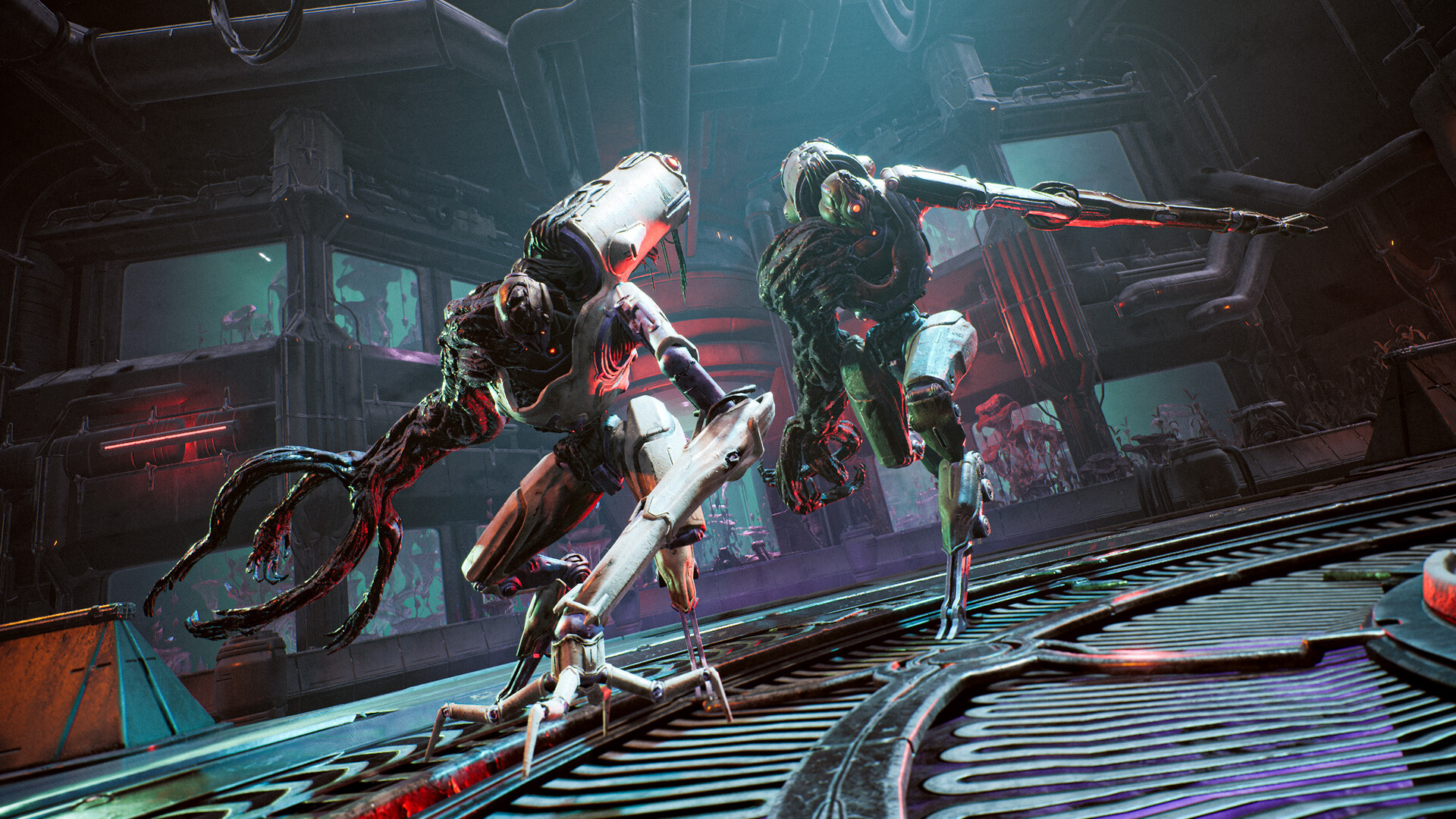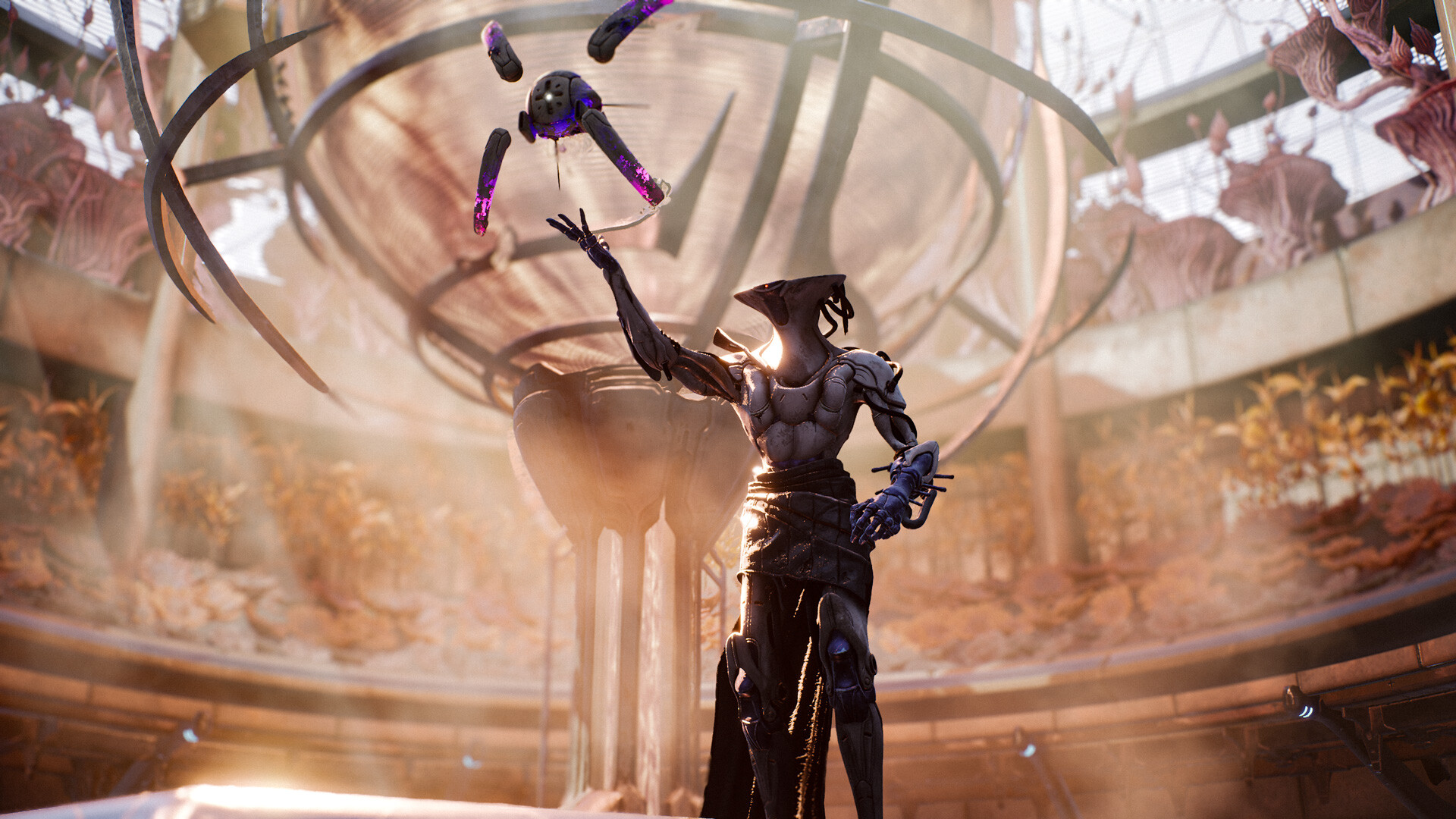Between all the critically acclaimed titles of last year, invariably kneecapping 2024 out of the gate on quantity and quality, I had a soft spot for Remnant 2. Then The Awakened King arrived and reminded me that the more things changed, the more they stayed the same for Gunfire Games’ approach to DLC. The Forgotten Kingdom didn’t do much to reignite my passion, even if it delivered a strong Archetype in the Invoker and the overpowered Monolith.
With Yaesha and Losomn out of the way, it’s time to return to N’Erud, perhaps my favorite location from the base game despite criticisms of flatness. The Dark Horizon takes place in an unknown section of the Drzyr’s forlorn construct focused on agriculture, which either failed given the rotting and discolored nature of the crops or succeeded based on the sheer yield of these abominations. Regardless, not even a few minutes into the DLC, it hit me with one of the unintentionally best set-ups for a plotline – finding the culprit behind my destroyed lift.
“Gunfire Games shakes things up by separating some locations into floating landmasses, accessible only by glider.”
I was to retrieve a prototype droid’s head, traipse across literal dark horizons and battle N’Erud horrors whose existence only just came to light… just because of a bumpy fall. This isn’t the best set-up for a DLC storyline, especially when it culminates in a space-defying battle. But damn, if the sheer insanity of the premise didn’t make me laugh.
To the writing team’s credit, the interactions were pretty fun. The enemy is convinced they could wipe me out, pushing the telepathic conversation to the potentially aneurysm-inducing brink, bringing up Cass and how I relegated her to the merchant life back in Ward 13 at the start.
Meanwhile, I’m mocking it for missing out on the human experience of suffering, sentimentality and inevitable futility while also threatening a beatdown. For all the emotional attachment that the rest of his new area inspired, this made for some fine banter.
The previous DLC was content to keep you relatively grounded when battling enemies in fancy hallways, trap-filled ruins, and discount Yharnam. Gunfire Games shakes things up by separating some locations into floating landmasses, accessible only by glider. Air drafts propel the player upward. Not only would you have to consider unexplored areas, but also how high said drafts could take you before the inevitable drift into the deathly sea of ooze below. Veer too much off course, and enemies will shoot you out of the air.
“Perhaps the worst new event involves breaking through deadly gas canisters and progressing through rooms before it can fully envelop them…”
Compared to N’Erud’s base desolate wastes, this is a decent change of pace for the exploration. The expired vegetation introduces a wrinkle or two, especially in events where activating a terminal would cause enemies to spawn, somewhat concealed in the weeds.
Having to drop down below to reach certain locations or navigating the crevasses and cliffs off to the sides also caused a rethink when desperately trying to fill in the map. Trying to navigate all this while progressing or exploring new areas can feel tedious without exact directions (and isn’t breaking any massive new ground mechanically). Furthermore, there are harrowing walkways and narrow corridors to uncover, just like in the base game’s version of N’Erud.
At times, certain sections can feel straight-up reused – the endlessly spiraling towers with desolate backgrounds evoke a strange sense of deja vu. Nevertheless, some of the mechanics of these locations can feel unique. A stealth section involves avoiding detection by robots to bypass the door ahead (where Hunter’s Mark is useful since it can sense them through walls).
Another centers on reaching the top of a spire while battling enemies, with platforms ascending and descending at brief intervals and enemies constantly spawning. Perhaps the worst of it involves breaking through deadly gas canisters and progressing through rooms before it can fully envelop them – not only is it difficult to see through the fumes, but your movement is severely limited. Hang around too much in it, and you die, with the checkpoints feeling too unforgiving.

“There is an impressive array of Amulets and Rings to play around with, especially when combined with the new Warden Archetype…”
On the bright side, enemy design is on point, especially the new foes. The Gardener is a grasshopper-like robot that can make massive jumps, slamming down and unleashing toxic gases before detonating them. Another new foe can either attack up close with blades and a barrier or hang back from afar to snipe you (breaking its shield will stagger it, providing a brief window of attack).
There’s also a hulking foe that bashes you with its mutated arm when it’s not trying to suck you in with a strange black hole attack. Some unbalanced spawn logic can still occur, resulting in overwhelming ambushes when trying to leave a specific area. Thankfully, these are fewer and farther between than previous DLC, with the new enemies feeling enjoyable to fight overall – not complete pushovers but manageable enough with their patterns and damage.
Some can appear as mid-bosses with modifiers and a few fresh attacks, as is tradition. The unique bosses can feel a bit on the low side. I haven’t discovered many weapons, but the Black Greatsword is fun with its charge mechanic. There is an impressive array of Amulets and Rings to play around with, especially when combined with the new Warden Archetype (which still feels annoying to unlock but significantly less so than The Forgotten Kingdom’s Invoker).
The latter’s drone would thrive in group play but provides some extensive synergy for several builds, whether you’re creating a set-up that stacks barriers and buffs you when they’re active or provides constant healing to make up for health drain in exchange for damage.

“Looking back on The Dark Horizon, I still feel significantly whelmed over what could have been in post-launch story-telling. However, it left me feeling somewhat more satisfied than the other DLC. “
It may not necessarily be the flashiest in terms of damage, but the utility and survivability feel outright broken sometimes. In the new Boss Rush mode, available to all players for free, it felt like I was dead to rights on multiple occasions but saved by the sheer amount of barriers provided, even with something as simple as activating the Ritualist’s Miasma in the middle of a crowd of enemies.
In terms of presentation, N’Erud’s aesthetic is still as appealing as it is somber, with the skyboxes and massive structures making you feel even more insignificant than ever (the dour color palette doesn’t help). There wasn’t too much noteworthy about the soundtrack, but the sound effects and sheer desolation of the atmosphere added to its immersion.
Looking back on The Dark Horizon, I still feel significantly whelmed over what could have been in post-launch story-telling. However, it left me feeling somewhat more satisfied than the other DLC. Maybe it was just being able to revisit N’Erud and see it in a new light, complete with new threats and challenges, even if one of the events is perhaps the worst currently in the game or the palette of new bosses doesn’t feel enough.
The DLC’s utterly ridiculous premise can’t be ignored, but I felt more satisfied than exasperated when it was all over. There was more enthusiasm to trawl through and uncover new secrets or accessories to tweak my build. If this is how Remnant 2’s DLC journey begins, then so be it, but at least it’s going out on a somewhat positive note with The Dark Horizon.
This game was reviewed on PlayStation 5.














